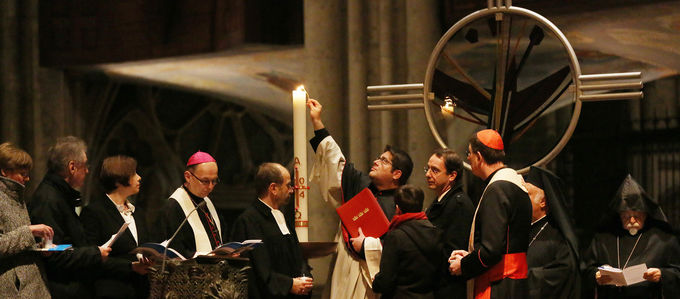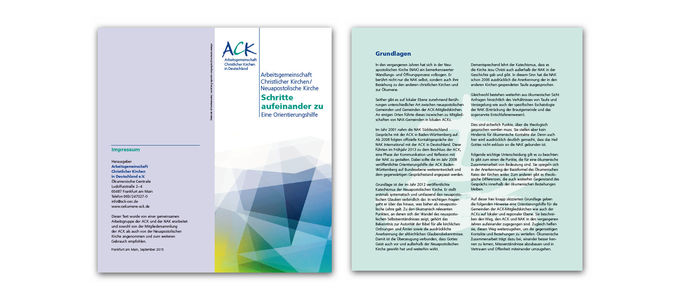Guide for interdenominational dialogue
The Working Group of Christian Churches in Germany (ACK) has published a new guide on its relations to the New Apostolic Church. To find out what this is all about, read on.
A similar guide was published by the ACK Baden-Württemberg already in the year 2008. Apostle Volker Kühnle, the contact of the New Apostolic Church for questions concerning the ecumenical movement, was already involved at that time. In the year 2001, following a surge in the public relations activities in his District Church of Southern Germany, he had sought contact to officials of other denominations. He finally ended up at the ecumenical association of Christian Churches in Germany, the ACK. This was followed by years of getting acquainted and assessing one another. The result, finally, was the aforementioned guide that was published in 2008.
The Catechism: a milestone
The Catechism of the New Apostolic Church was published at the end of 2012. It is a milestone that facilitates theological encounters with other Christians. With the Catechism the New Apostolic Church, as an institution, attracted the attention of other Churches. This is how the national Working Group of Christian Churches took the decision to expand the scope of the 2008 guide and make it applicable in all of Germany. A number of discussions followed over the last two years in which theological principles were discussed.
In the foreword of the guide it says, “The basis [for the discussions] is the Catechism of the New Apostolic Church published in the year 2012. This is the first time that the New Apostolic faith is systematically and comprehensively presented in a binding fashion. In important questions it goes beyond what has previously been considered New Apostolic doctrine. Among the ecumenically relevant points—which reflect the transformation that has taken place in the New Apostolic self-conception—are the confession that the Bible is authoritative for all ecclesiastical orders and ministries as well as the explicit acknowledgement of the early church creeds.”
The guide lists those points that are important for an ecumenical collaboration. They are reflected in the acknowledgement of the basic formulation of the World Council of Churches. The guide also states that there are theological differences that will continue to be the subject of discussion within the ecumenical relations.
A very promising outcome
The handout is designed in such a way that it immediately becomes clear which points are meant. Included are the significance and recognition of baptism, ecumenical services and prayers, and acts of blessing. It addresses interfaith marriages, joint events, and community and social activities. It also touches on points that affect the congregations directly, such as the performance of choirs, the use of church spaces, and the collection of donations for welfare and social purposes and charitable projects.
In conclusion the guide states, “Triggered by the opening of the New Apostolic Church, there have been intensive discussions and contacts between the ACK and the New Apostolic Church on a regional as well as a national level since the beginning of 2001. This has been a good base and mutual trust has grown. Today there is increasing collaboration as well as guest memberships at the local level. This guide promotes and supports the concerted effort of the NAC and the ACK in identifying common ground and deepening ecumenical cooperation.”
The guide is available from the ACK, but the flyer will also be distributed to the New Apostolic congregations in Germany. The Church leadership has ordered 20,000 copies, which will be distributed to the congregations through the administrative offices.
A guide for Switzerland
The Working Group of Christian Churches in Switzerland (AGCK) and the New Apostolic Church Switzerland want to publish a similar guide at the end of October. This flyer will be a first in the history of the AGCK in Switzerland. Both Churches have opened themselves up over the last few years and have found common ground. After years of preparation in a joint commission, the New Apostolic Church received guest status in the AGCK in the year 2014.
The Ecumenical Council of Christian Churches in Austria (ÖRKÖ) published a guide on its relations with the New Apostolic Church in the year 2014.










